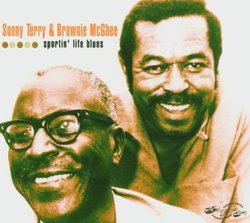American Music
Bronto | 04/20/2006
(5 out of 5 stars)
"In 1977, at Indiana University's student union bookstore, I bought my first blues album, Sonny Terry and Brownie McGhee's Everest LP, Hootin' and Hollerin', the provenience of which I've never been able to trace. The sound was thin and the packaging mediocre, but I loved it. Over the years, my blues collection grew, but not my Terry and McGhee collection. I was following the rule of thumb that the recordings that make a perfomer a legend are better than those he makes once he's a legend, I'd read that Terry and McGhee had recorded many dull albums, especially those aimed at the folk market, and I simply never knew what to choose from among the re-issues, anthologies, and live albums that overflowed the Terry and McGhee bins and forced other albums to the edges of record stores' blues sections. Three decades have passed, and this double CD, along with a CD credited to Brownie McGhee, The Same Ol' Diddley-Dee (Zirconbleu, 2001), with which Sportin' Life Blues shares several cuts, solves my problem.Sportin' Life Blues collects singles recorded for various labels from 1940 through 1952. The sound is good, the notes excellent. Collectors will want to know that none of the cuts, with one possible exception, were recorded by Terry and McGhee as a formal duo. All 51 cuts feature one or the other, and most feature both, but not as partners. Collectors will also want to know that various legends, among them Woody Guthrie, Washboard Sam, and Brownie's often underrated brother, Stick, pop up throughout the recordings.I think of this music as blues, but a half-dozen other appellations are also apt. It might be most accurate to call it by the name coined, I think, by the Blasters twenty-some years ago -- American music. These recordings bring together any number of traditions and foreshadow two or three more. They're raucous and ebullient and straightforward in the way that some mistake for simplistic and others for easily duplicated. The music is also history, of course, but an odd sort of history that swings or rocks, depending on how you want to hear the tale, and doesn't mind if you dance during the lecture. In fact, it prefers that you do."


 Track Listings (51) - Disc #1
Track Listings (51) - Disc #1